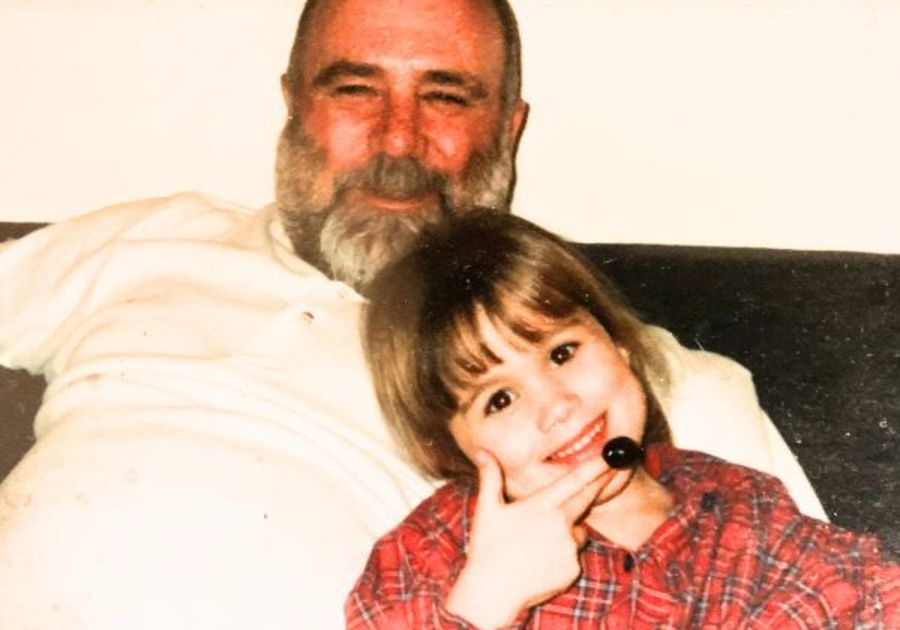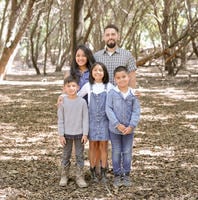When I was 5 years old, my Papa, Everett “Bud” Goold Jr., suffered a significant hemorrhagic stroke. This meant a large amount of bleeding in his brain. This required a craniotomy, or brain surgery to relieve pressure from the bleeding. Our family was not sure what the future would hold for him as he was in critical condition. After quite some time in the hospital he spoke his first word: duck. How exciting! It was a very fitting word for him as he was a lover of the outdoors, hunting, and fishing. Who would have thought we would be so grateful for a single word? It was evident that the road ahead would not be easy for him.
A stroke can instantly change someone’s life. My Papa owned a backhoe company, loved to be outdoors, and enjoyed spending time barbecuing for his friends and family. My Papa and I were like peanut butter and jelly- inseparable! I was the only grandchild to be able to know him before and after his stroke and for that I feel so blessed.
After his stroke, his life consisted of rehab (speech therapy and physical therapy), watching TV, and reading the newspaper. He had speech therapy for years as a symptom of his stroke was Broca’s aphasia. Broca’s aphasia is a loss of language. It can include significant word finding issues and agrammatic language. He could get his messages across, but it was not in a grammatically correct way. I called it, “Papa talk.” He also required physical therapy as he was paralyzed on the right side of his body. He eventually attended UOP’s graduate student clinic for about 10 years. He loved a good conversation and a chance to learn about someone else’s life. If he heard anything scandalous, he would share it and follow it up with, “I don’t say much,” as he covered his mouth with his hand and chuckled.
His side table next to his recliner always had a word search, a couple of post-it notes with supplies needed or thoughts he didn’t want to forget, the Oxford Picture Dictionary (highly recommended for individuals with Aphasia), and a cup of cold coffee. My Papa had to work so hard to communicate, walk, and care for himself. I appreciate all of my abilities even more because of watching his tough post-stroke life. He was so inspiring. A simple phone call to him would result in a, “You made my day kid!”
When I first started college, I was an international business major at San Jose State. I began to take my classes during my freshman year and had an identity crisis–business was not for me, but I had no idea what I wanted to do. I did some soul searching and considered physical therapy due to my Papa’s experience, then I stumbled upon the Speech-Language Pathology Program and that was that. I switched my major and I am so grateful I did. Seeing communication stripped from my Papa fueled my desire to help others be better understood. My papa’s experience has also helped me have perspective in all situations. You have no idea at what level someone was functioning prior to a brain injury. You also have no idea what their potential can be. While I have chosen to work with the pediatric population, I have a soft spot for older people struggling with their communication.
My Papa lived for 23 and a half years after having his stroke. It wasn’t at all easy for him, but I am so grateful for my time with him and the impact he had on so many. He passed away in January 2022 and I miss him dearly. Not a day passes by without him entering my thoughts. As I write this, my eyes are filled with tears. If I could tell him one thing, it would be, “You made my life Papa!”
I urge you to become aware of the signs of a stroke, not only to help yourself, but also to help others receive intervention early!
Stroke Signs straight from Stroke.org:
F.A.S.T. Warning Signs
Use the letters in F.A.S.T. to spot a Stroke
- F = Face Drooping – Does one side of the face droop or is it numb? Ask the person to smile. Is the person's smile uneven?
- A = Arm Weakness – Is one arm weak or numb? Ask the person to raise both arms. Does one arm drift downward?
- S = Speech Difficulty – Is speech slurred?
- T = Time to call 911 – Stroke is an emergency. Every minute counts. Call 911 immediately. Note the time when any of the symptoms first appear.
Other Stroke Symptoms
Watch for Sudden:
- NUMBNESS or weakness of face, arm, or leg, especially on one side of the body
- CONFUSION, trouble speaking or understanding speech
- TROUBLE SEEING in one or both eyes
- TROUBLE WALKING, dizziness, loss of balance or coordination
- SEVERE HEADACHE with no known cause
https://www.stroke.org/en/about-stroke/stroke-symptoms
If you have any questions about the information shared please don’t hesitate to reach out at the contacts listed below.
Call or text: (209) 683-3427
Email: mackenzie@communicationblooms.org
Visit our website: communicationblooms.org



